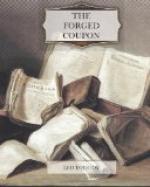The impressions made upon Tolstoy during this period of active service gave vivid reality to the battle-scenes in “War and Peace,” and are traceable in the reflections and conversation of the two heroes, Prince Andre and Pierre Besukhov. On the eve of the battle of Borodino, Prince Andre, talking with Pierre in the presence of his devoted soldier-servant Timokhine, says,—“’Success cannot possibly be, nor has it ever been, the result of strategy or fire-arms or numbers.’
“‘Then what does it result from?’ said Pierre.
“’From the feeling that is in me, that is in him’—pointing to Timokhine—’and that is in each individual soldier.’”
He then contrasts the different spirit animating the officers and the men.
“‘The former,’ he says, ’have nothing in view but their personal interests. The critical moment for them is the moment at which they are able to supplant a rival, to win a cross or a new order. I see only one thing. To-morrow one hundred thousand Russians and one hundred thousand Frenchmen will meet to fight; they who fight the hardest and spare themselves the least will win the day.’
“‘There’s the truth, your Excellency, the real truth,’ murmurs Timokhine; ’it is not a time to spare oneself. Would you believe it, the men of my battalion have not tasted brandy? “It’s not a day for that,” they said.’”
During the momentous battle which followed, Pierre was struck by the steadfastness under fire which has always distinguished the Russian soldier.
“The fall of each man acted as an increasing stimulus. The faces of the soldiers brightened more and more, as if challenging the storm let loose on them.”
In contrast with this picture of fine “morale” is that of the young white-faced officer, looking nervously about him as he walks backwards with lowered sword.
In other places Tolstoy does full justice to the courage and patriotism of all grades in the Russian army, but it is constantly evident that his sympathies are most heartily with the rank and file. What genuine feeling and affection rings in this sketch of Plato, a common soldier, in “War and Peace!”
“Plato Karataev was about fifty, judging by the number of campaigns in which he had served; he could not have told his exact age himself, and when he laughed, as he often did, he showed two rows of strong, white teeth. There was not a grey hair on his head or in his beard, and his bearing wore the stamp of activity, resolution, and above all, stoicism. His face, though much lined, had a touching expression of simplicity, youth, and innocence. When he spoke, in his soft sing-song voice, his speech flowed as from a well-spring. He never thought about what he had said or was going to say next, and the vivacity and the rhythmical inflections of his voice gave it a penetrating persuasiveness. Night and morning, when going to rest or getting up, he said, ’O God, let me sleep like a stone and rise up




